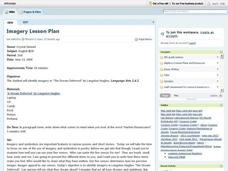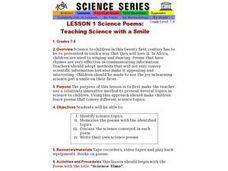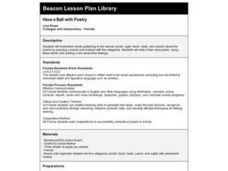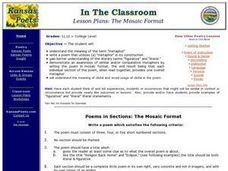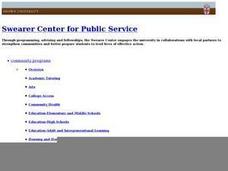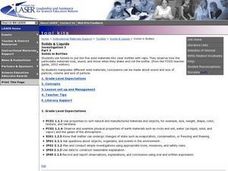Curated OER
Imagery Lesson Plan
Learners are introduced to the term imagery. Individually, they read "The Dream Deferred" and note examples of imagery in the poem. To end the lesson, they write their own poem making sure to use the five components of imagery.
Curated OER
Teaching Science with a Smile
Students study science concepts as they are presented in poetic form. They write and present their own science poems to parents during Open House.
Curated OER
Color Poems
Students listen as the teacher reads several poems from the book "Hailstones and Halibut Bones," "My Many Colored Days," and a teacher created poem. Students choose a color and share some brainstorming ideas with the class. They write a...
Curated OER
Using My Senses
Students observe crickets in the terrarium. Have them record in their journal any evidence of crickets having senses. Then they answer questions like these: How do they use their sense organs? Where are they are located?
Curated OER
Our Poetic Planet : Writing Poems about the Earth
Students share their thoughts regarding nature. In this poetry lesson, students compose poems in different formats that feature weather and clouds.
Curated OER
Improving Descriptive Writing: Painting an Original Picture
Descriptive writing is rich in sensory appeals and paints pictures in the minds of readers. Show young writers how to use an on-line thesaurus and a cliché website to create fresh, descriptive writing. The presentation ends with an...
Curated OER
Modernism: American Literature 1914-1945
What characterizes modern literature? The first few slides of this 31-slide PowerPoint discuss what sparked the change to Modernism and discuss some of the key figures of the time (like Karl Marx and Sigmund Freud). The 20s and 30s are...
Curated OER
Have a Ball with Poetry
Second graders brainstorm words pertaining to the senses about the beach. They write a free verse poem, using these words and adding a line about their feelings.
Curated OER
Poems in Sections: The Mosaic Format
Students explore poetry. They examine metaphors. Students discuss and write examples of "figurative" and "literal" language. They read mosaic poetry. Students write a poem in mosaic format.
Curated OER
A Sense Of Water
Students examine several writings from both locals and Peace Corps volunteers from several African countries. Students reflect on how the writer's interactions with water are presented through the material. Students write their own pieces.
Curated OER
Adventures in Alice
Students create a haiku and illustrate it on the computer. In this haiku lesson plan, students review the history of the haiku while they are outside and then write their own. Students then use a computer program to illustrate their poem.
Curated OER
Out of the Dust: Background notes about the novel, The Great Depression, and The Dust Bowl
If your class is reading the historical fiction novel, Out of the Dust, then you are in luck. Here are a few slides that will help you provide historical context for the book, as well as define main characters, setting, symbolism, and...
Curated OER
Smells Like Christmas, Exploring the Nose
Students discover that the sense of smell helps us to enjoy life and explore unsafe conditions. They smell Christmas by making gingerbread ornaments.
Loudoun County Public Schools
Figurative Language Packet
A definitive resource for your figurative language unit includes several worksheets and activities to reinforce writing skills. It addresses poetic elements such as simile and metaphor, personification, hyperbole, and idioms, and...
Brooklyn Children’s Museum
Inside India
What can a Ganesh statue, hand ornament, and print block tell you about India? Introduce your learners to the geography, history, and culture of India by analyzing primary sources and using the well-designed worksheets provided in this...
Curated OER
Hidden Objects
Fourth graders feel objects hidden in paper bag, and describe how they feel, smell, sound and/or taste.
Curated OER
Wild Wonderful Walk
Students explore the outdoors. In this poetry instructional activity, students spend time outdoors and write a poem about what they felt and saw. Students can do this activity in pairs or alone. Students blindfold their partner to focus...
Curated OER
Reflecting/Writing after a field trip or other experience
Students reflect on field trips in writing. In this journal writing lesson, students write about a recent experience by using 4 of their senses to tell what they remember. They turn these into poetry.
Curated OER
Tastes Like Christmas, Exploring Taste
Second graders explore the four familiar tastes and taste buds.
Curated OER
Picnics-- Chinese Style
Third graders explore about the Chinese rituals of poetry competition. They compare and contrast Chinese picnics with American picnics. Students create short poems, celebrating their own spring poetry picnic. They discuss words or...
Curated OER
Solids in Bottles
Young scholars use funnels to put the five solid materials into clear bottles with caps. They observe how the particulate materials look, sound, and move when they shake and roll the bottle. Finally, students write "sound and touch"...
Montgomery County Public Schools
Summer Journal Ideas
Twenty prompts, fifteen starters, and ten situations. What more could you ask for from a list of journal ideas?
Gwinnett County Public Schools
Analysis of the Tuck Everlasting and The Birchbark House Text Exemplars
Looking to introduce some text-based questions into your ELA lessons? Practice the kinds of skills the Common Core demands with the seven text-based questions and the essay prompt provided here. Designed to be a three-day instructional...
Curated OER
Leaves of Grass by Walt Whitman
In this online interactive reading comprehension worksheet, students respond to 12 multiple choice questions about Whitman's Leaves of Grass. Students may submit their answers to be scored.


